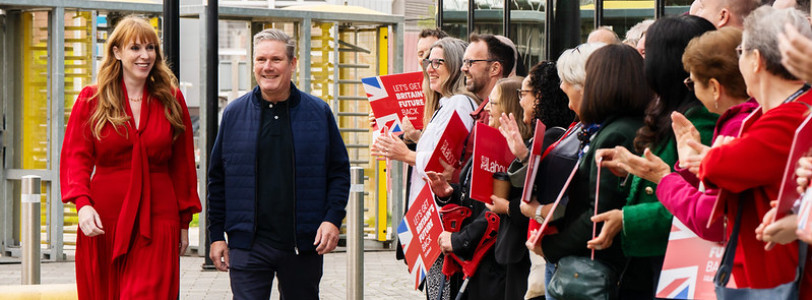With wide centrist appeal, the 2023 Labour Party conference revealed a subtlety to political strategy heretofore unseen under Starmer’s premiership. As expected, Labour consistently shamed the Tories. As expected, they alluded multiple times to celebrated New Labour policies. However, they also went further. The Conservatives no longer offer a viable political option to centrists. Therefore, the Labour Party is positioning itself as the only option in UK politics which not only attracts the centre-left, but also the centre-right.
Centrist appeal
The Labour Party crossed a partisan divide to appeal to traditional and One Nation Conservative voters disillusioned with a party creeping further right each year. He invited voters who “despair” at the current government to join Labour.
“If you feel our country needs a party that conserves. That fights for our union. Our environment. The rule of law. Family life. The careful bond between this generation and the next. Then let me tell you: Britain already has one. And you can join it. It’s this Labour party.”
Together, the rhetoric comprising Starmer and Sunak’s conferences speeches reveal a shift in how Labour is choosing to position itself. On the one hand, Sunak framed himself as the change candidate, a position historically adopted by the progressive left. In contrast, Starmer referred to Labour as a party that conserves. Effectively, the Tories offer no viable option to the centre ground. It’s a bold strategy, and one that’s been long awaited.
It appears to have worked already. Party optimism was galvanised following the Labour victory in the Rutherglen and Hamilton West seat. The 20% SNP swing to Labour was significantly higher than the 5% needed for the win and also higher than the 11% swing registered in Scotland at large. The Scotsman labelled it “the beginning of the end” and signals Labour is exceeding its performance in the polls.
Healing
Messages of healing dominated the key speeches. Party faithful responded to Starmer’s leadership and Labour factions drew together in apparent harmony. Tony Blair and Gordon Brown lent their centrist kudos and supported him throughout. As the best ever attended Labour conference, in stark contrast to the Tory flop, Corbynism has been officially quashed under Starmer’s heel.
Starmer’s keynote speech on Tuesday appealed to Labour history and images of national flourishing. After being interrupted by a protester calling for a citizens’ assembly, Starmer’s rhetoric looked back to the future to go forwards. The 1997 election has to always be Labour’s chief point of recollection. “If you think our job in 1997 was to rebuild a crumbling public realm, that in 1964 it was to modernise an economy left behind by the pace of technology, in 1945 to build a new Britain out of the trauma of collective sacrifice, then in 2024 it has to be all three.”
Starmer continued, “People are looking to us because they want our wounds to heal, and we are the healers. People are looking to us because these challenges require a modern state, and we are the modernisers. People are looking to us because they want to build a new Britain, and we are the builders.”
New Labour influence: homes, community & NHS
A pivotal policy forming part of Labour’s ‘decade of national renewal’ is the 1.5 million homes it plans to build, funded by upfront investment from the private sector. Echoing 1997 decentralisation, key to delivering housing policy is Starmer’s plans to devolve greater planning power to local councils and mayors, granting communities more agency and ownership over the housing planning and investments.
New Labour’s legacy shone through again in Labour’s Community Policing Guarantee, which outlined ‘tough’ police action in a five-point plan. The scheme promises more police on the beat, zero tolerance of antisocial behaviour, a crackdown on shoplifting and violence, communities being at the heart of policing, and making community policing a point of pride.
That Tony Blair has endorsed, and likely helped to guide, Labour policy under Starmer is evident in proposed NHS reforms. Blair insists that an effective healthcare system must utilise technology. A ‘Fit for the Future Fund’ worth £171m would purchase new equipment with inbuilt AI tools to aid efficient diagnoses whilst the number of CT and MRI scanners would be doubled to cut waitlists.
Economy
Shadow Chancellor Rachel Reeves promised an economy with “iron-clad fiscal rules”, recalling the last Labour government which granted the Bank of England operational independence. She proposed to wage a “war on waste” by culling government use of private jets, slash government consultancy spending and crack down on “covid fraud” by appointing a Covid Corruption Commissioner.
In response to the economic meltdown caused by Truss’ premiership, Reeves proposed a new Charter for Budget Responsibility, subjecting any significant tax and spending changes is reviewed by the Office for Budget Responsibility. Should Labour win, Reeves also highlighted her role as Britain’s first female Chancellor. She emphasised the need to close the gender pay gap.
With rhetorical references to traditional Toryism replete throughout the conference, Reeves proclaimed, “Labour is the party of builders not blockers; Labour is the party of economic growth…Labour is the party of homeownership.”
Education
Despite being “very comfortable with private schools”, Starmer still plans to remove tax breaks for private schools. Currently, around 50% of the UK’s 2,500 private schools are registered as charities, thus removing the tax break status is estimated to raise £1.7bn.
The money raised would contribute to upskilling teachers to teach what Starmer termed “real world maths skills” like financial literacy and budgeting. Labour education policy would also ensure children are taught the right skills to flourish in creative industries.
The final key education reform aims to strengthen local industries by reforming the apprenticeship levy to fund specialist training colleges to educate workers for industries like computing, engineering and renewable energy.
Culture
Shadow Culture Secretary Thangam Debbonaire has revived the party’s pursuit of culture and creativity. At the conference she announced a National Culture Infrastructure Plan, called Space to Create, which would “fire up the engines of our creative economy.”
Furthermore, a National Culture Infrastructure Map would help local businesses, leaders and donors be better informed about where to invest and develop in the UK. Debbonaire said would give “space to create teams around the country providing guidance, training, learning and networking to give creative businesses a stronger footing.”
She also confirmed a proposal to implement a visa waiver system for artists working and travelling in Europe.
Young Futures
Coupled with educational reform, the proposed Young Futures programme (worth up to £100m) aims to support young people at risk of being drawn into violent crime and also delivering crucial mental health support. The policy contributes towards Labour’s goal of halving youth violence and knife crime within 10 years. Shadow Home Secretary Yvette Cooper promised that a Labour government would “give young people their future back.”
What’s next?
Until the date of the 2024 general election is confirmed and campaigning begins, we’ll be keeping an eye on the movements and strategies of the Labour party.
Want to get involved? Why not tell us what you think about the party conference season by posting to Voice.









0 Comments